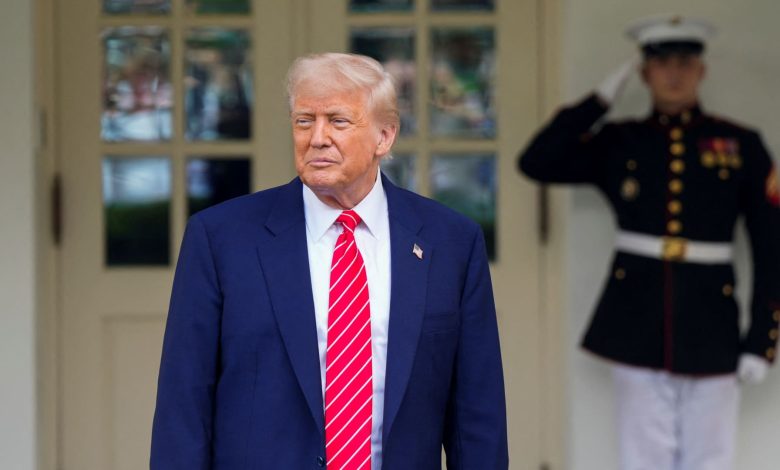Trump’s crypto agenda threatened by his pursuits of personal profits

U.S. President Donald Trump looks on as he gives remarks outside the West Wing at the White House in Washington, D.C., U.S., May 8, 2025.
Kent Nishimura | Reuters
President Donald Trump is standing in his own way when it comes to passing crypto legislation.
Lawmakers this week rejected the GENIUS Act — a bill meant to establish federal rules for stablecoins — due in part to concerns that President Trump’s personal cryptocurrency ventures have created an unprecedented conflict of interest.
“Currently, people who wish to cultivate influence with the president can enrich him personally by buying cryptocurrency he owns or controls,” Sen. Jeff Merkley, D-Ore., said in a statement to CNBC explaining his opposition to the bill. “This is a profoundly corrupt scheme. It endangers our national security and erodes public trust in government.”
Stablecoins are digital currencies that are pegged to the value of other assets, like the U.S. dollar.
Getting anything passed in Congress is a steep uphill battle for Republicans given their razor-thin majority in the House, filibuster-proof requirement in the Senate, and Democrats’ increasingly unified stance against President Trump’s agenda. But enough Democrats appeared to be on board with a stablecoin law to bring about a rare bipartisan win for the president.
That’s until $TRUMP got in the way.
The president’s meme coin, which he launched just before the inauguration in January, has added billions of dollars of paper worth to his coffers. Its value soared last month after the project ran a promotion offering top $TRUMP holders a dinner with the president and a “VIP White House tour.” Sen. Richard Blumenthal, D-Conn., called it a “pay-for-play scheme.” First Lady Melania Trump has a coin as well.
The GENIUS bill failed to advance in the Senate on Thursday. It needed 60 votes to move to the Senate floor for final passage. The final tally was 48 in favor and 49 against. Three senators didn’t vote.
Earlier in the week, Senate Democrats unveiled the “End Crypto Corruption Act,” spearheaded by Merkley and Minority Leader Chuck Schumer of New York, meant to prohibit elected officials and senior executive branch personnel and their families from issuing or endorsing digital assets.
But the key defections to the stablecoin legislation came last weekend, when a group of nine Senate Democrats — four of whom had previously voted for the bill in committee — said that they wouldn’t support it and called for stronger provisions to address “anti-money laundering, foreign issuers, and national security.”
‘Ongoing self-dealing’
Sen. Lisa Blunt Rochester of Delaware was one of the four. She pointed directly at Trump’s financial entanglements.
“I also remain concerned about the ongoing self-dealing and financial conflicts of interest being carried out by the Trump family,” she wrote in a statement on Thursday.
It’s not just about the $TRUMP and $MELANIA meme coins. There’s also the Trump family crypto venture World Liberty Financial, which was established last year and launched a stablecoin just as the administration pushed for looser regulations on digital assets.
Reports have indicated that Abu Dhabi-based MGX is using Trump’s stablecoin for a $2 billion investment in crypto exchange Binance, creating yet another potential conflict of interest for a sitting president.
For some investors and entrepreneurs in the crypto industry, the president’s pursuit of personal profits is creating a major impediment to long-awaited advancements. After years of setbacks during the Biden administration, the crypto lobby became a powerful force in funding Trump’s 2024 campaign and in successfully backing industry-friendly candidates for Congress.
“It’s unfortunate that personal business is getting in the way of good policy,” said Ryan Gilbert, founder of fintech venture fund Launchpad Capital. “I would hope that everybody in the administration, including the president, gets out of the way of good policy.”
The White House didn’t respond to a request for comment. At a press conference on Friday, White House press secretary Karoline Leavitt said, when asked about the meme coin dinner, that “the president is abiding by all conflict of interest laws.”
“The president is a successful businessman, and I think it’s one of the many reasons that people reelected him back to this office,” Leavitt said.
A number of top Democrats, including Sen. Elizabeth Warren of Massachusetts and Kirsten Gillibrand of New York have joined the parade of critics, targeting President Trump’s personal pursuits. Gillibrand helped introduce the GENIUS Act earlier this year, but she said this week that there are “a number of outstanding issues that needed to be addressed before the bill could pass the full Senate.”
“I believe it is essential to the future of the U.S. economy and to everyday Americans that we enact strict stablecoin regulations and consumer protections where none currently exist,” Gillibrand said in a statement. “I remain extremely confident and hopeful that very soon we can finish the job.”
Sen. Blumenthal called for an investigation into Trump-linked coins, demanding financial records from World Liberty Financial and slamming the president for “the attempted use of the White House to host competitions to prop up the value of $TRUMP.”
Sen. Ruben Gallego, D-Arizona, had supported the GENIUS Act but said he couldn’t move forward this week after Republicans declined to provide more time to negotiate.
“Without more time to at least finish the bill, there was no true bipartisan path forward,” he wrote on X.
Launchpad’s Gilbert said the GENIUS Act is just the first piece. More broadly, the president’s conflicts could have an impact on hopes for other legislative achievements and deregulation efforts as well as the reputation of the U.S. crypto industry on the world stage.
“We will be the laughing stocks of the world for this particular reason, and it will hold back continued investment and innovation,” Gilbert said. “There was hope for the past six months that that we could lead in the United States, and that investment should pour into crypto-related businesses, and then it will be simpler and doable again, for all companies to take a lead and to invest in crypto assets.”
However, he said, “if the GENIUS Act doesn’t pass, we’re back to square one.”
WATCH: Ether surges nearly 25% for its best week in four years: CNBC Crypto World




